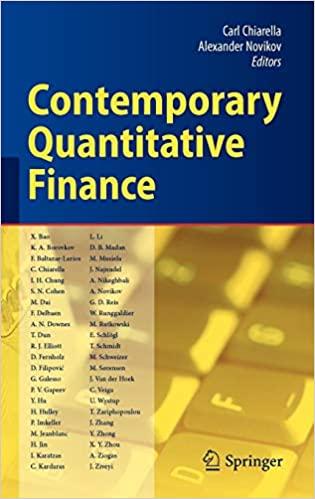Question
QUESTION 1 An investment has expected cash flows of -$200, $100, $220, $90 and $45 at the end of years 0 through 4, respectively. The
QUESTION 1
An investment has expected cash flows of -$200, $100, $220, $90 and $45 at the end of years 0 through 4, respectively. The required return is 8.5%. Using interpolation, estimate the payback period for this investment.
| a. | 2.45 years | |
| b. | 1.45 years | |
| c. | 2.0 years | |
| d. | 1.2 years |
1 points
QUESTION 2
An investment has expected cash flows of -$200, $100, $220, $90 and $45 at the end of years 0 through 4, respectively. The required return is 8.5%. Determine the investment's Net Present Value.
| a. | $181.98 | |
| b. | $174.92 | |
| c. | $211.22 | |
| d. | $196.14 |
1 points
QUESTION 3
An investment has expected cash flows of -$200, $100, $220, $90 and $45 at the end of years 0 through 4, respectively. The required return is 8.5%. Estimate the investment's profitability index, and is this expected to create shareholder value (yes or no)?
| a. | No--PI needs to exceed zero | |
| b. | No--PI equals 1.91 | |
| c. | Yes--PI equals 0.91 | |
| d. | Yes--PI equals 1.91 |
1 points
QUESTION 4
An investment has expected cash flows of -$200, $100, $220, $90 and $45 at the end of years 0 through 4, respectively. The required return is 8.5%. Estimate the investment's Equivalent Annual Annuity.
| a. | $55.56 | |
| b. | $51.95 | |
| c. | $45.50 | |
| d. | $46.18 |
1 points
QUESTION 5
The ____ method indicates whether value is expected to be created for shareholders
| a. | Both PI and NPV | |
| b. | PI | |
| c. | NPV | |
| d. | IRR and PBP |
1 points
QUESTION 6
Grantran Metrics is considering new equipment to run their service function for their customers. This equipment would run faster and less expensively than equipment currently in place. This would be best characterized as:
| a. | Independent investment | |
| b. | Replacement problem | |
| c. | Contingent investment | |
| d. | Expansion investment |
1 points
QUESTION 7
A company is evaluating two competing investments. Investment X has a cost of $100,000 and a NPV estimated at $35,000. Investment Y has a cost of $220,000 and a NPV estimated at $35,500. Taking everything into account, you would recommend the company undertake which investment and why?
| a. | Neither investment is acceptable. | |
| b. | Not sure. Need additional information. | |
| c. | Take investment X, since it has almost the same value creating potential, but costs a fraction of Y. Do something else with the $120,000 saved up front. | |
| d. | Undertake investment Y as it produces more shareholder value. |
1 points
QUESTION 8
Two investments, C and D are being evaluated. They are mutually exclusive. Investment C has a higher NPV using any discount rate between zero and 9%, while D has a higher NPV using any discount rate between 9.1% and 15%. Which investment do you recommend the company undertake? The cost of both opportunities is the same. Which of the following is the BEST answer?
| a. | Recommend C if the required return is between zero and 9 percent. | |
| b. | Recommend C if the required return is between 9.1% and 15%. | |
| c. | Recommend C. | |
| d. | Recommend D. |
1 points
QUESTION 9
Capital rationing is described as:
| a. | Selecting only the one opportunity with an expected return greater than the required return by the largest spread. | |
| b. | Being allocated exactly enough capital to undertake all value creating opportunities. | |
| c. | Having less capital than could be invested in value creating opportunities. | |
| d. | Having as much capital as can be profitably investment in value creating opportunities. |
1 points
QUESTION 10
An investment requires an initial outlay of $50,000, and is expected to generate cash flows of $13,000 a year for eight years. The required return is 11%. Determine the replacement chain NPV for this investment to compare it to a mutually exclusive alternative with a 12 year life.
| a. | $53,782 | |
| b. | $42,630 | |
| c. | $21,320 | |
| d. | $92,630 |
Step by Step Solution
There are 3 Steps involved in it
Step: 1

Get Instant Access to Expert-Tailored Solutions
See step-by-step solutions with expert insights and AI powered tools for academic success
Step: 2

Step: 3

Ace Your Homework with AI
Get the answers you need in no time with our AI-driven, step-by-step assistance
Get Started


